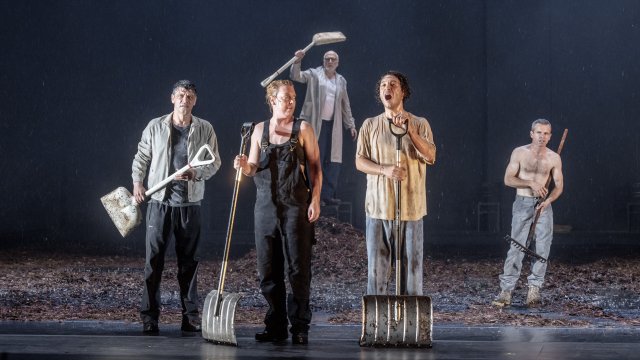Roland Schimmelpfennig’s appropriation of antiquity resembles a theatrical archaeological excavation – as in the “Anthropolis” prologue staged here at the Deutsches Schauspielhaus in Hamburg.
Photo: picture alliance/Markus Scholz
When the theaters reduced their performances during the lockdowns of the last few years, moved them online or stopped them altogether, some cultural pessimists were already wondering: Will the audience ever come back? It’s coming, it seems.
And yet drama is having a hard time in this young millennium. Films and series, life and eyewitness reports, so-called project developments and deliterate spectacles find their way onto the stage. However, contemporary pieces are difficult to achieve.
Long gone are the days when contemporary drama not only filled the auditoriums but was also read. Really? The much-played playwright Roland Schimmelpfennig is also an exceptional figure in this respect.
With Karin Beier, he has gained one of the most exciting directors of the moment, and with the Deutsches Schauspielhaus in Hamburg, a stage of hardly comparable size and quite a reputation, to stage his latest prank. With “Anthropolis,” Schimmelpfennig has written a cycle of antiquity that shows the entire skill of this author and results in five theater evenings, the second part of which can be seen these days at the Berlin Theatertreffen.
Dionysus, Laios, Oedipus, Jocasta and Antigone – these are the names of the five parts of the large-scale text. And they point a good two thousand years into the past, back to the zero hour of European theater. But, as reading the classics shows us and Schimmelpfennig also shows us, the ancient myths of the Greeks do not deal with the problems of the distant past, but with those of modern people.
It’s not without reason that the headline is “Anthropolis.” People and the city are the oversized themes of this drama. You could also say: It’s about the always highly dramatic attempt at human coexistence.
What stories the Greeks have in store for us! We encounter blind rulers, human overzealousness, divine striving when people lack greatness, sexuality as an eternal engine, struggle and love in the family.
But why use Schimmelpfennig when you can pull Homer out of the bookshelf, which needs to be dusted off anyway? Because he finds his own, well-readable language for stories that have often already been told and need to be continued to be told.
It’s the familiar Schimmelpfennig sound: the sentences are clear and precise, the author doesn’t shy away from repetition. And what cannot be said in dialogue, what is of a different scenic nature, still fits into the speech of the characters because an expanded idea of a narrative theater reigns here. Schimmelpfennig doesn’t make things easy for himself, but instead looks for the shape that suits the materials. He rewrites the dramas of the ancient classics, invents new, pointed dialogues, reanimates the choir and creates a timeless literature between linguistic updating and otherworldly mythology.
Nevertheless: God is dead, Nietzsche teaches us. And haven’t those gods that the ancient Greeks wrote about decayed for too long? Are you still talking to us? First of all: “Anthropolis” is primarily about people. And the gods still rule, they are the actual or imagined fate, they are the inevitable, they are the limits to which people reach. And who, especially today, would deny that there are limits? The coexistence that we see as society, organized by people themselves, is a sad experiment that always threatens to ultimately fail due to human error.
Approaching with Schimmelpfennig the human tragedies, which for a while were assumed to be shelved or incomprehensible in the constantly ironic stream of consciousness in late capitalism, does not, however, first and foremost affect one. One suspects that such theatrical-archaeological excavations will contribute to a picture that allows us to see things more clearly.
“Knowledge and insight / are the beginning of all happiness,” Schimmelpfennig’s choir calls out to us.
Roland Schimmelpfennig: Anthropolis. Monster city of Thebes. Fischer paperback, 512 pages, br., 22 €.
